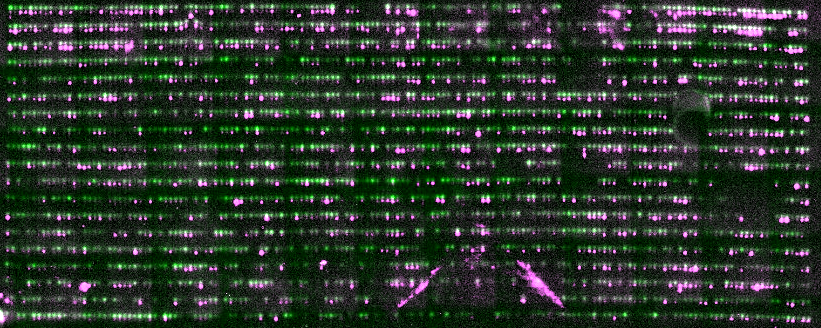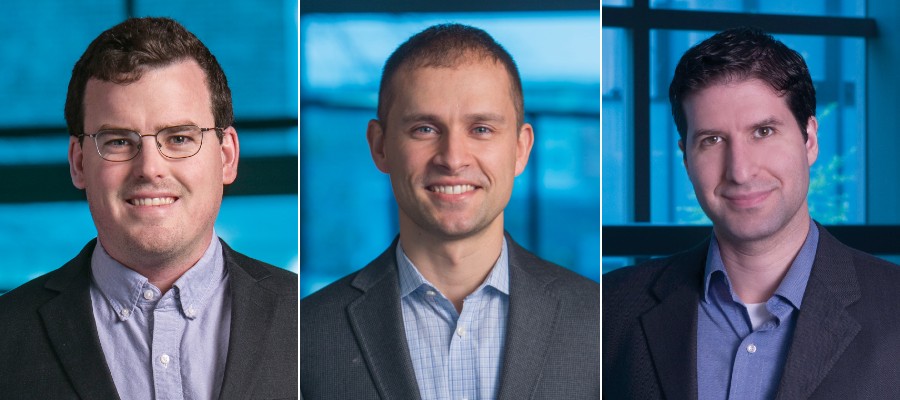
Penn Health-Tech’s Nemirovsky Engineering and Medicine Opportunity (NEMO) Prize awards $80,000 to support early-stage ideas joining engineering and medicine. The goal of the prize is to encourage collaboration between the University of Pennsylvania’s Perelman School of Medicine and the School of Engineering and Applied Science by supporting innovative ideas that might not receive funding from traditional sources.
This year, the NEMO Prize has been awarded to a team of researchers from Penn Engineering’s Department of Bioengineering. Their project aims to develop a technology that can detect multiple cancer biomarkers in single cells from tumor biopsy samples.
As cancer cells grow in the body, one of the characteristics that influences tumor growth and response to treatment is cancer cell state heterogeneity, or differences in cell states. Methods that rapidly catalogue cell heterogeneity may be able to detect rare cells responsible for tumor growth and drug resistance.
Single-cell transcriptomics (scRNA-seq) is the standard method for studying cell states; by amplifying and analyzing the cell’s complement of RNA sequences at a given time, researchers can get a snapshot of what proteins the cell is in the process of making. However, this method does not fully capture the function of the cell. The field of proteomics, which captures the actual protein content of cells along with post-translational modifications, provides a better picture of the cell’s function, but single-cell proteomic methods with the same sensitivity as scRNA-seq do not currently exist.
This collaborative project, which joins Assistant Professors Alex Hughes and Lukasz Bugaj, as well as Professor Andrew Tsourkas, aims to change that by developing multiplexed, sensitive and highly specific single-cell proteomics technologies to advance our understanding of cancer, its detection and its treatment.

This new technology, called scProteome-seq, builds from Hughes’s previous work.
“My specific expertise here is as an inventor of single-cell western blotting, which is the core technology that our team is building on,” says Hughes. “Single-cell proteomics technologies of this type have a track-record of commercial translation for applications in basic science and clinical automation, so our approach has a high potential for real-world impact.”
The current technology from Hughes’ lab separates proteins in cells by their molecular weight and “blots” them on a piece of paper. Improvements to this technology included in this project will remove the limitation of using light-emitting dyes to detect different proteins and instead use DNA barcodes to differentiate them.
The team has already shown coupling and recovery of the barcodes from scProteome-seq blots, and are now ready to perform sequencing experiments showing proof of principle that protein amounts and positions can be read and used to reconstruct single-cell proteomes.
Hughes’s multidisciplinary research expertise in creating self-organization in synthetic tissues uses engineering rules derived from developmental biology. His work aids in the application of technological innovations such as 3D printing in regenerative medicine by first understanding the “blueprint” of developmental patterning in our bodies.
Bugaj’s expertise in cancer cell signaling, synthetic biology, optogenetics and protein engineering are brought to the project as well.
“We study how individual cells integrate signaling inputs from pathways, how such signal processing controls stem cell and tissue behaviors, and how signal processing can break down in disease and contribute to pathologies like cancer or drug resistance,” says Bugaj.
“This expertise has been essential for the design and implementation of the DNA barcodes central to scProteome-seq, as well as the development of qPCR and sequencing assays to quantify and benchmark assay readout,” he says. “We will also apply scProteome-seq to understand signaling protein heterogeneity in drug resistance in EML4-ALK lung cancer cells, which we are currently studying in our lab.”
Tsourkas’ lab brings expertise in combining chemistry, nanotechnology, and protein engineering to create novel targeted imaging and therapeutic agents designed to improve the detection and treatment of disease.
“I have established a comprehensive set of protocols for various highly efficient and site-specific bioconjugation methodologies,” says Tsourkas. “Recently, my lab has leveraged these technologies to label antibodies with a diverse range of cargo from small molecules to large proteins, including nucleic acids, for use in a diverse range of applications from diagnostics to the cytosolic delivery of antibodies. Some of these reagents are now available commercially from AlphaThera, a company that I founded in 2016.”
Successful creation of scProteome-seq will remove limitations to progress in single-cell proteomics by drastically increasing the number of biomarkers that can be quantitatively measured at the same time. The technology will enable highly resolved studies into the post-translational landscape of single cells, in cancer progression and treatment and well beyond. The impact also extends to personalized medical diagnostics by providing high-resolution and patient-specific information on tumor aggressiveness, treatment selection based on biomarker fingerprinting and residual disease monitoring.
